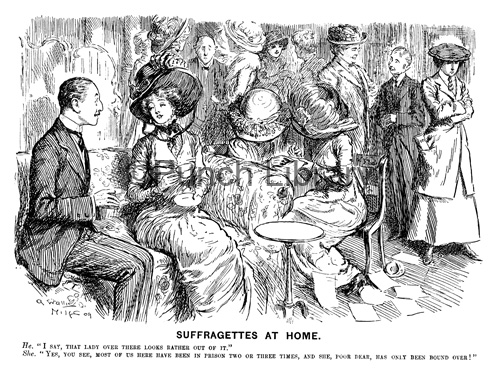On Monday, Suzanne Venker published
a brief article in which she argues:
I’ve accidentally stumbled upon a subculture of men who’ve told me, in no uncertain terms, that they’re never getting married. When I ask them why, the answer is always the same.
Women aren’t women anymore.
...Fortunately, there is good news: women have the power to turn everything around. All they have to do is surrender to their nature – their femininity – and let men surrender to theirs.
If they do, marriageable men will come out of the woodwork.
Unsurprisingly, the very women who Venker labels as "angry" and "defensive" were outraged by the suggestion and did not hesitate to express that outrage.
Meghan Casserly for
Forbes, in one of the tamer articles, writes:
Women, do you hear Suzanne Venker? It’s all your fault. The women’s sexual revolution has left you too aggressive and too needy at the same time—two things “good men” absolutely abhor. But it’s not so much the changing that’s pissing mankind off, ladies. No, we’re pissing them off by expecting them to change along with us. To help us.
Venker writes that women have changed in recent decades and that men have stayed the same–as there hasn’t been a revolution that demanded it. But it seems that very revolution might be upon us. Modern men have two options: to change—or continue going the way of the buffalo.
Erin Gloria Ryan for
Jezebel was predictably more outraged:
Venker's piece for Fox News, which extrapolated from changing attitudes about marriage that there's an entire subculture of men who don't want to get married, and that's because women are scaring them away by competing with them, was roundly mocked for being stupid, mindless garbage that paints women as testicle eating castrators and men as delicate babies upset that their feelings aren't being appropriately catered to. Women aren't letting men "win" in this ongoing battle of the sexes, and in response, men are taking their ball(s) and going home. Marital Lysistrata, if you will.
As was her counterpart, Jessica Wakeman, at
Frisky:
2. I’ve … stumbled upon a subculture of men who’ve told me, in no uncertain terms, that they’re never getting married. When I ask them why, the answer is always the same. Women aren’t women anymore.
Also, Mommy makes his favorite Hamburger Helper whenever he asks and does not charge any rent for sleeping on that old couch in her basement. And she has no idea all that porn he’s downloaded is the reason why her computer is running so slow.
6. Now the men have nowhere to go.
Waaahhhhh. Fap fap fap fap fap.
Or the similarly lofty response of Kaili Joy Gray for
Daily Kos:
Being a lady writer who writes about how ladies totally suck is such hard work.
It's especially hard work if you make your living telling other ladies they shouldn't make a living because of The ChildrenTM and also because it will make men feel bad about themselves. Keeping all the hatred and blame straight can really hurt your ladybrain and make you write things you totally didn't mean to write.
And Kristin Iversen of
The L Magazine:
The opening shot [in the War on Men] was sounded today by Suzanne Venker when she posted an article on Foxnews.com entitled "The war on men." [sic] What about the war on capitalization, Suzanne? What about that?
Apparently, capitalization of titles is just one of the casualties in this epic struggle. But no matter, we have more important things to focus on. Namely, why don't men like women anymore? What did women do to fuck up the sweet deal that they've had for centuries? You know. The one where women didn't have the right to vote until less than a hundred years ago. The one where women still don't make anything like equal pay for doing an equal amount of work. The one where women are expected to take on all of the household chores and childcare responsibilities and look the other way while men have as much freedom as they want. THAT SWEET DEAL.
Emma Gray for the
Huffington Post quips:
Meanwhile, we women will quit our jobs, purchase aprons with our last paychecks and bake like it's 1955. A workforce reduced by nearly half? That's bound to get this society headed in the right direction.
Meagan Morris for
Cosmopolitan chimes in:
We've come a long way as a gender since the birth of feminism and—gender pay gap, be damned—have the same rights and opportunities as our dude counterparts.
Oopsies, though: We silly women now have too much equality, according to Suzanne Venker. The Fox News columnist hypothesizes that the reason why so-called "marriageable men" don't want to get married is because today's women don't make them feel like the super manly men women of say, the 1800s, would have...
So, all of us single ladies are destined to be single forever—and its our own fault—because we want to have careers and fulfilling lives.
Then there was Hanna Rosin at
Slate:
I knew that women had become more educated. I knew they were steadily earning more money. I knew they had gained a lot of power of late, and sometimes even more money and power than the men around them. But I did not realize they had become so powerful that they could mess with the men’s DNA. How did I miss that? How has J.J. Abrams not made a movie about it?
Unfortunately, Venker is somewhat enigmatic about how to reverse this problem, beyond a few vague clues. Women, she says, “have the power to turn everything around” (Duh, of course, we have ALL the power). “All they have to do is surrender to their nature – their femininity – and let men surrender to theirs.” Surrender to my femininity. Surrender to my femininity. I get the general idea but what does it mean, like, in practice? Not wear pants so much? Let my hair grow. Ask my boss to pay me a little less? Open to ideas.
Are you noticing a trend here? No, it isn't the generally liberal or openly feminist bent of these publications. It isn't the condescending attitude that suggests that any challenge to prevailing notions about gender in public discourse is beneath serious reply. It isn't even the logically fallacious, but nevertheless ubiquitous, guilt-by-association with Phyllis Schlafly (which I did my best to edit out). It's the fact that all of these commentators are women.
Granted, I didn't lift up there skirts and check (as if any of them wear skirts...ha), though that surely would have been my prerogative in 1955 or the 1800s or whenever we're locating that fictionalized era when women were actively, systematically, and universally oppressed by men. Nevertheless, it seems clear that what we have here is a bunch of women sitting around in a closed off group trying to decide whether or not and how men are trying to oppress women and failing as men.
Go figure.
Speaking on behalf of the testicled among us, or at least as one male among many, you women are welcome to continue to ascend in the workforce. Most of my colleagues are already women, as are most of my immediate supervisors. Continue to dominate academics. Be ever more consciously aggressive, more coldly rational, more unreservedly sexual, more delightfully vulgar because, after all, men have gotten away with it for years and anything we can do, you can do better. Earn equal pay for equal work, and, for the sake of reparations, reverse the pay gap for a while just to teach us a lesson. You have my permission, which you neither need nor want and which is undoubtedly a mere vestige of a paternalistic cultural heritage passed unconsciously to me by my forefathers (<--term deliberately not gender inclusive).
Meanwhile, all I ask for is the simple right to find those qualities unattractive. If the idea of my home becoming a staging ground for working out gender equality doesn't comport with the notions of domestic bliss that I developed when I was a little boy playing house and you were a little girl playing sister suffragette, I trust you won't think me too primitive. While you are off pursuing your dreams, I ask only that you don't count among your goals the wholesale destruction of my dream of enjoying a wife who makes me feel like a man, the sort of man
Nick Charles was in the 1930s with his young, rich, opinionated, strong-willed wife who adored him. I have never, nor would I ever, force a woman to do anything, but you'll forgive me if I don't buy into the newest, shiniest model of woman just because you're telling me she's the wave of the future. The old model works just fine, the kind who recognizes that
the quests for love and equity are sometimes adversarial.
So you can scoff if you want and hurl petty insults at Suzanne Venker, but--personally, anecdotally--there seems to be more than a little truth in the argument that men aren't interested in competing all day at work and coming home to find domestic competition hovering just beneath the surface. What do you care? You don't want men like me anyway, and the men you do want don't want women like Suzanne Venker or Phyllis Schafly anyway--you know, the publicly outspoken, well-educated, career women that feminists are trying to get rid of.
If we're lucky, men will go on blaming the demise of marital tranquility on women; women will persistently nag men to change with the times and lament the failures of the brutish sex when empowered women can't find husbands; and before it's all over, maybe the world won't collapse under the wait of its own mushrooming population.




